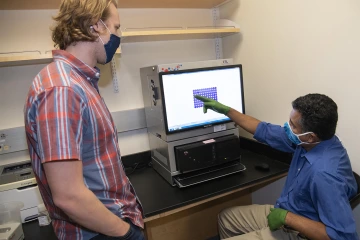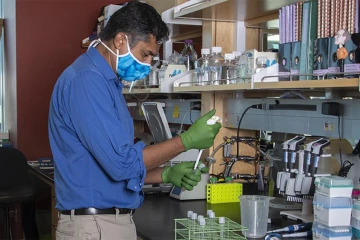UArizona Health Sciences Researchers Identify New Target for Developing Flavivirus Vaccines
Antibodies normally fight viruses, but in the case of flaviviruses, they can make infections worse. UArizona Health Sciences immunologists figured out why.
A 2002 outbreak of West Nile virus in North America was unprecedented in terms of the number of cases and geographic spread of the virus. In 2016, Zika virus was cited as a public health emergency of international concern as an epidemic swept through the Americas. Cases of dengue fever peaked in 2019, with the World Health Organization estimating that 390 million people a year are infected with dengue.

Mosquito fogging is one of the few defenses against diseases caused by flaviviruses in many parts of the world including Malaysia, which saw an outbreak of dengue this year.
What do all of these epidemics have in common? Flaviviruses.
Flaviviruses, which are commonly spread by mosquitos and ticks, cause diseases such as dengue, Zika, West Nile, Japanese encephalitis, yellow fever and several others. They are extremely prevalent – 40% of the world’s population live in areas with a risk of dengue, according to the U.S. Centers for Disease Control and Prevention – and their effects can be devastating.
In spite of the public health risk flaviviruses present, few effective vaccines are available. Deepta Bhattacharya, PhD, a researcher at the University of Arizona Health Sciences, is working to change that.
“Our lab has long been interested in the basic processes that give you protective antibody-mediated immunity to different viral infections,” said Dr. Bhattacharya, an associate professor in the College of Medicine – Tucson’s Department of Immunobiology. “We focus on identifying the features of an immunization that will lead to protective immunity and on understanding why things go wrong.”
Stumbling Blocks to Vaccine Development
When a person is infected with a virus, antibodies are produced to fight the virus and provide immunity against reinfection. In the case of flaviviruses, however, if a person gets a second flavivirus infection – they were originally infected with Zika and then were infected with dengue, for instance – the presence of antibodies can result in more severe symptoms through a process called antibody-dependent enhancement of infection.

Deepta Bhattacharya, PhD, studies antibody responses to infections and vaccines, and recently focused his research of flaviviruses.
“The biggest challenge to vaccine development by far is antibody-dependent enhancement,” Dr. Bhattacharya said. “How do you actually generate immunity without having that happen? That's been a huge challenge, and it's one of the reasons why there are no widely approved dengue virus vaccines out there.”
The first dengue vaccine was licensed in December 2015, but an analysis nearly two years later showed that people who never had dengue at the time of vaccination had a higher risk of more severe subsequent infections compared with unvaccinated people. Multiple lawsuits followed, and now, the vaccine is recommended only for people who previously have had at least one documented dengue infection.
To unravel the mystery of antibody-dependent enhancement in flaviviruses, Dr. Bhattacharya went back to the basics of antibody production: plasma cells and memory B cells.
Building Blocks to Immunity

Graduate student Tyler Ripperger and Dr. Bhattacharya examine viral assays.
Plasma cells are the primary drivers of long-lasting immunity, as they continue to produce antibodies once an infection has been cleared or after vaccination. Memory B cells only produce antibodies if a second infection occurs.
“One of the questions we've had for a long time is, what is the purpose of those memory B cells?” said Dr. Bhattacharya, who is a member of the university’s BIO5 Institute. “If you already have antibodies from plasma cells, why do you need the other cells?”
In 2011, Dr. Bhattacharya co-authored a paper that highlighted the difference in antibody production between plasma cells and memory B cells. His later research looked at plasma cells to determine how they are activated, why they persist and how they maintain immunity against infections.
“That's when the hypothesis came that memory B cells are probably there to deal with things that are different than the first exposure,” he said. “It became important for us to understand how they recognize viruses that are different.”
“Our lab has long been interested in the basic processes that give you protective antibody-mediated immunity to different viral infections.”
Deepta Bhattacharya, PhD, Associate Professor, Department of Immunobiology
Dr. Bhattacharya and his team recently completed a study that examined how memory B cells respond to subsequent flavivirus infections. They found that when memory B cells are activated by a new infection, they produce antibodies that are diverse and capable of targeting viruses that have changed since the first infection, through mutation or infection with a slightly different strain, for example.
“There is a huge amount of hidden diversity in memory B cells. For most viral pathogens, like influenza or SARS-CoV-2, this is a good thing. It means that memory B cells are poised to make new antibodies and deal with mutations if and when they arise,” Dr. Bhattacharya said. “For flaviviruses, this is not so great. We found that memory B cells produce a lot of suboptimal antibodies that could enhance the second infection.”
Although memory B cells recognize the new virus as a flavivirus and produce antibodies, those antibodies are unable to stop the new virus from infecting cells. In fact, they may actually make the second infection worse by acting as “Trojan horses” and carrying the virus into the cells, where it can make the disease worse.

Dr. Bhattacharya’s research could lead to the development of new vaccines to fight flavivirus diseases around the world.
The findings give Dr. Bhattacharya and his team a new way to think about creating flavivirus vaccines. Rather than targeting the whole virus, they propose targeting specific locations on the virus that are unique to each type and strain. Essentially, they would be removing memory B cells from the vaccination equation.
“The next step is taking this knowledge and designing new immunogens that are very specific for one flavivirus strain, so if you make antibodies against it, it will only recognize that one strain and there's no possibility that will then enhance the infection,” Dr. Bhattacharya said about how he plans to build on the memory B cell research moving forward. “This project in particular has been the toughest project we have had. In the end, it was absolutely worth it because it gives us some key information on how we should be making these vaccines.”
Our Experts
Contact
Stacy Pigott
Office of Communications
520-621-7239 / 520-539-4152
spigott@arizona.edu

